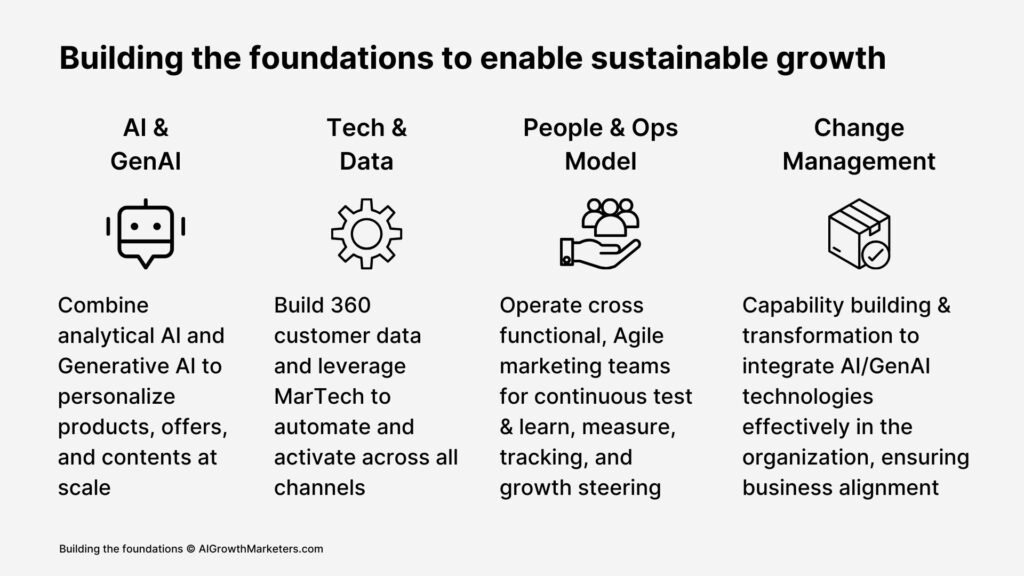The AI Growth Marketing Framework is a comprehensive approach that integrates Artificial Intelligence (AI) into growth marketing strategies. It focuses on strategic planning, leveraging key growth levers, and building the foundations for AI-enabled growth. This framework aims to optimize marketing efforts through AI for data analysis, customer segmentation, personalized experiences, and continuous capability building within agile teams. The four foundational elements of this framework are AI & GenAI, Tech & Data, People & Operating Model, and Change Management. Let’s dive into each of these foundations to understand their significance and application.

What are the 4 Foundations in the AI Growth Marketing Framework?
AI & GenAI
By combining the strengths of Analytical AI and Generative AI, businesses can achieve a powerful synergy that elevates their marketing strategies to new heights. Analytical AI uncovers deep insights into customer preferences and behaviors, providing a solid foundation of data-driven understanding. Generative AI then leverages these insights to craft personalized content, offers, and campaigns, allowing for highly targeted and relevant interactions. This dynamic partnership ensures a seamless and engaging customer experience, as data-driven intelligence and creative automation work hand in hand to deliver personalized marketing at scale.
Analytical AI
Analytical AI encompasses advanced analytics and machine learning techniques that enable marketers to understand and predict customer behavior. With tools such as predictive affinity models and recommender systems, businesses can analyze vast amounts of data to identify trends, preferences, and future actions. For instance, a predictive affinity model can forecast which products a customer is likely to purchase next, while recommender systems can suggest items based on past behavior. These insights allow for more effective targeting and personalization, leading to higher engagement and conversion rates.
Generative AI
Generative AI revolutionizes content creation by automating the development of text, images, and videos. This technology can generate blog posts, social media content, product descriptions, and even promotional videos, significantly reducing the time and resources required for content production. Additionally, Generative AI can automate campaign development, creating personalized marketing messages at scale. By combining analytical insights with generative capabilities, businesses can deliver highly personalized products, offers, and content, enhancing customer experience and driving growth.
Tech & Data
360 Customer Data
A 360-degree view of customer data is crucial for effective AI-enabled marketing. This comprehensive view, often achieved through Customer Data Platforms (CDP), consolidates data from various sources into a single, unified profile. CDPs collect data from multiple touchpoints such as social media, website interactions, and purchase history, providing a holistic understanding of each customer. This unified view allows marketers to create highly personalized and targeted campaigns, improving customer engagement and loyalty.
MarTech
Marketing technology (MarTech) tools are essential for implementing AI growth marketing strategies. Examples of MarTech tools include customer relationship management (CRM) systems, email marketing platforms, and social media management tools. These technologies enable marketers to automate processes, track customer interactions, and measure campaign performance. For instance, a CRM system can help manage customer relationships by tracking interactions and preferences, while an email marketing platform can automate personalized email campaigns based on customer behavior.
People & Operating Model
Operating cross-functional, agile marketing teams is vital for continuous testing, learning, and growth. Agile teams are composed of members with diverse skills, working collaboratively to achieve common goals. This approach allows for rapid experimentation, quick adaptation to changes, and continuous improvement. Agile marketing teams use methodologies such as Scrum or Kanban to manage their workflows, ensuring efficient and effective execution of marketing strategies.
These teams focus on measurable results, tracking key performance indicators (KPIs) to gauge success and identify areas for improvement. By fostering a culture of collaboration and continuous learning, businesses can ensure that their marketing efforts are always aligned with customer needs and market trends.
Change Management
Integrating AI and GenAI technologies into an organization requires effective change management. Capability building and transformation are essential to ensure that these technologies are used effectively and align with business objectives. This involves training employees on new tools and processes, fostering a culture of innovation, and ensuring that there is alignment between AI initiatives and overall business goals.
Change management also involves addressing potential resistance to new technologies and processes. By clearly communicating the benefits of AI and GenAI, providing adequate support and resources, and involving employees in the transformation process, businesses can ensure a smooth and successful integration of AI into their growth marketing strategies.
Summary
The AI Growth Marketing Framework is built on four foundational elements: AI & GenAI, Tech & Data, People & Operating Model, and Change Management. Each of these elements plays a critical role in leveraging AI to drive growth and innovation in marketing. By understanding and implementing these foundations, businesses can optimize their marketing efforts, deliver personalized experiences at scale, and achieve sustainable growth.
To explore these foundations in greater detail, stay tuned for our upcoming blog posts where we will dive deeper into each element and provide practical tips and insights for implementing the AI Growth Marketing Framework in your organization.



